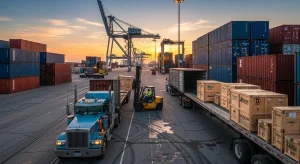UPS Inc. plans to cut 20,000 jobs and close dozens of facilities by downsizing during 2025.
UPS Inc., the U.S.-based company specializing in transportation, logistics, and supply chain management, announced on April 29 that it plans to cut 20,000 jobs in 2025 and close dozens of facilities. The move comes in response to a sharp decline in shipments destined for e-commerce giant Amazon.com Inc.
The Atlanta-based company will shut down 73 company-owned and leased facilities by the end of June and is considering closing more centers. This is part of a broader plan to optimize its network and adapt to the drop in low-margin shipments.
UPS aims to cut costs and improve profitability, with a savings target of $3.5 billion in 2025. The restructuring also includes a significant workforce reduction: the operational cuts will impact 4% of its 490,000 employees and are in addition to the elimination of 12,000 management positions announced earlier in 2024. These adjustments reflect a strategy focused on prioritizing higher-margin services and increasing efficiency in the face of a changing logistics landscape.

UPS Inc.: Can It Adapt to Uncertainty?
The e-commerce boom driven by the pandemic pushed delivery companies to seek greater efficiency amid declining shipping volumes. UPS Inc. is among the companies that, in recent years, have worked to optimize operations and increase shipment volume. Although it has remained stable in that regard, new industry challenges—especially trade policy changes—have introduced new demands requiring adaptation.
The volatility of the global economy and the continued growth of online commerce have prompted UPS to rethink its strategic approach. As a result, the company has pulled back from its 2025 financial outlook, stating that it will not provide an update “given the current macroeconomic uncertainty,” according to TransportTopics. Still, the company reported adjusted earnings of $1.49 per share for the first three months of the year, beating analysts’ average estimate of $1.40, according to Bloomberg data.
UPS shares rose 2.2% in premarket trading in New York. However, the stock had dropped 23% year-to-date as of the close on April 28. Companies like UPS and FedEx Corp. have long been seen as barometers of the broader economy because their delivery networks span both industrial and retail sectors, providing insight into order activity from both manufacturers and consumers. Investors across all sectors are closely watching for signs of how Trump’s trade policies might drag the economy into a recession.

UPS Refocuses Its Strategy
According to data shared by TransportTopics, UPS is refocusing its strategy to move away from low-margin package deliveries and concentrate on more profitable segments. In line with this goal, the company recently acquired Canadian firm Andlauer Healthcare Group Inc. for $1.6 billion as part of its plan to generate $20 billion in healthcare revenue by 2026.
Factors such as market volatility, international trade tensions, and evolving tariff policies have made long-term planning more difficult. Nevertheless, the company has confirmed that its planned job and facility cuts remain in place for 2025. This decision has sparked concern and discontent among employees, especially in a context where thousands of layoffs and closures have already been announced. Uncertainty looms for both the company and its workforce.

Love on the open road: the best dating apps for truckers
If you’re looking for someone to go the long haul with, here are the best dating apps for truck drivers. They say love is everywhere…

The most congested cities in the U.S. and the world in 2025
The annual TomTom Traffic Index produces a ranking of the most congested cities in the world. The annual TomTom Traffic Index presents an analysis of

Steady Growth Signals Strong Momentum in the U.S. Trucking Industry
Trucking growth in the United States is gaining strength in 2026, driven by higher freight demand, expanding logistics activity, and new opportunities for carriers and fleet operators.

Escalating litigation costs in the U.S. trucking industry
Civil liability litigation has become increasingly costly for businesses, particularly for the trucking industry. Civil liability litigation has become increasingly costly for businesses, particularly for

Is Tesla saying goodbye? Is the end of the road for these models
During Tesla’s earnings call, CEO Elon Musk announced both models that will be discontinued in the second quarter of 2026. Is Tesla saying goodbye? Not

Black Ice: The Invisible Danger on Winter Roads
Black ice is one of the most dangerous road conditions during winter because it forms a nearly invisible layer over the pavement. It eliminates traction and can cause a total loss of vehicle control in seconds.
